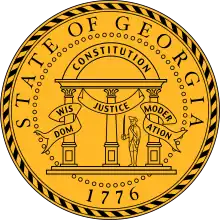Clifford Walker | |
|---|---|
.jpg.webp) | |
| 64th Governor of Georgia | |
| In office June 30, 1923 – June 25, 1927 | |
| Preceded by | Thomas W. Hardwick |
| Succeeded by | Lamartine Griffin Hardman |
| Attorney General of Georgia | |
| In office 1915–1920 | |
| Governor | Nathaniel Edwin Harris Hugh Dorsey |
| Preceded by | Warren Grice |
| Succeeded by | R. A. Denny |
| Personal details | |
| Born | Clifford Mitchell Walker July 4, 1877 Monroe, Georgia, US |
| Died | November 9, 1954 (aged 77) Monroe, Georgia, US |
| Resting place | Old Baptist Cemetery |
| Political party | Democratic |
| Spouse | Rosa Mathewson |
| Alma mater | University of Georgia |
Clifford Mitchell Walker (July 4, 1877 – November 9, 1954) was an American attorney and politician from the U.S. state of Georgia.
A graduate of the University of Georgia in 1897, he was a member of the Sigma Alpha Epsilon fraternity.[1]
Walker served consecutive two-year terms as the 64th Governor of Georgia as a Democrat from 1923 to 1927, after winning with the support of the Ku Klux Klan.[2] Walker made few legislative advances during his term as governor, and is largely remembered for his membership in the KKK and his inclusion of KKK leadership in policy matters throughout his term.[3] His additional political service included the office of Mayor of Monroe, Georgia.
Before his gubernatorial terms, Walker served as the state attorney general from 1915 to 1920. He also was a co-founder of the Woodrow Wilson College of Law in Atlanta, Georgia. Walker made the first appointment of a poet laureate of the U.S. state of Georgia, that being Frank Lebby Stanton in 1925.
He was born in Monroe in 1877. Walker died at his home in Monroe in 1954 and was buried in the Old Baptist Cemetery in that same city.
Notes
- ↑ Pandora. Athens, Georgia: University of Georgia. 1895. p. 65.
- ↑ Lucket, Robert E. "Thomas Hardwick (1872–1944)" http://www.georgiaencyclopedia.org/articles/government-politics/thomas-hardwick-1872-1944
- ↑ Huff, Christopher Allen. "Clifford Walker (1877–1954)" http://www.georgiaencyclopedia.org/articles/government-politics/clifford-walker-1877-1954
References
- Georgia State Archives Roster of State Governors
- Georgia Governor's Gravesites Field Guide (1776–2003)
